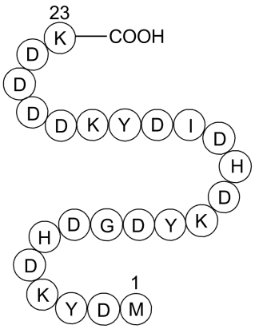
瀏覽量: 161
- 產(chǎn)品名稱: 3X FLAG Peptide
- 產(chǎn)品貨號(hào): CSGP10149
- 貨期: 現(xiàn)貨
- 價(jià)格與訂購: 683
- 數(shù)量:
庫存: 10
- 規(guī)格: 5mg 25mg
- 產(chǎn)品信息
- 如何訂購
實(shí)驗(yàn)參考方法
ELISA experiment [1]:
Preparation method The solubility of this peptide in sterile water is >10 mM. Stock solution should be splited and stored at -80°C for several months.
Applications 3-Flag peptide has found widespread use as a mild purification reagent for Flag-epitope tagged recombinant proteins. Although its affinity columns release monovalent flagged proteins in the absence of calcium, the antibody retains substantial affinity for the Flag sequence even in metal-free conditions, so that it has been impossible to use it to develop a metal-sensitive ELISA assay. This is due to the ability of the antibody to remain bound to polyvalent surface-coated antigen, for instance, when Flagged proteins are bound to ELISA plates or blotting filters. The resultant antigen polyvalence raises the avidity of the Flag antibody to a point where the reaction is essentially calcium-independent. However, when the antibody itself was made monovalent, by proteolytic cleavage to the Fab, this situation was reversed and the ELISA reaction became calcium-dependent. This new metal-dependent ELISA assay was used to explore the metal requirements of the antibody in detail. Among divalent metals, binding tapered off with increasing radius above that of calcium, or with decreasing radius below that of calcium. Several smaller metals, such as nickel, acted as inhibitors of the binding reaction. Substantial binding was demonstrated for heavy metals such as cadmium, lanthanum and samarium. Because it is of interest to use this antibody for the co-crystallization of recombinant Flag-fusion proteins, the ability to bind heavy metals was a significant finding.
References:1. Hopp TP1, Gallis B, Prickett KS. Metal-binding properties of a calcium-dependent monoclonal antibody. Mol Immunol. 1996 May-Jun;33(7-8):601-8.
產(chǎn)品描述
The FLAG-tag system utilizes a short, hydrophilic 8- amino-acid peptide that is fused to the protein of interest1. The FLAG peptide binds to the antibody M1. Whether binding is calcium-dependent manner2 or –independent3 remains controversial. A disadvantage of the system is that the monoclonalantibody purification matrix is not as stable as others. In general, small tags can be detected with specific monoclonal antibodies.
To improve the detection of the FLAG tag the 3x FLAG system has been developed. This threetandem FLAG epitope is hydrophilic, 22-amino-acids long and can detect up to 10 fmol of expressed fusion protein. The FLAG-tagged maltodextrin-binding protein of Pyrococcus furiosus has been crystallized4 and the quality of the crystals was very similar to that of crystals of untagged protein.
Finally, the FLAG-tag can be removed by treatment with enterokinase, which is specific for the five C-terminal amino acids of the peptide sequence5.
References:
1. Hopp TP, Prickett KS, Price VL, Libby RT, March CJ, Ceretti DP, Urdal DL, Conlon PJ (1988) A short polypeptide marker sequence useful for recombinant protein identification and purification. Bio/Technology 6:1204–1210.
2. Hopp TP, Gallis B, Prikett KS (1996) Metal-binding properties of a calcium dependent monoclonal antibody. Mol Immunol 33:601–608.
3. Einhauer A, Jungbauer A (2000) Kinetics and thermodynamical properties of the monoclonal antibody M1 directed against the FLAG peptide. 20th International symposium on the separation of proteins, peptides, and polynucleotides (ISPPP). Lublijana, Slovenia, November 5–8, 2000.
4. Bucher MH, Evdokimov AG, Waugh DS (2002) Differential effects of short affinity tags on the crystallization of Pyrococcus furiosus maltodextrin-binding protein. Biol Cryst 58:392–397.
5. Maroux S, Baratti J, Desnuelle P (1971) Purification and specificity of procine enterokinase. J Biol Chem 246:5031–5039.
Cas No.
N/A
SDF
N/A
別名
H-Met-Asp-Tyr-Lys-Asp-His-Asp-Gly-Asp-Tyr-Lys-Asp-His-Asp-Ile-Asp-Tyr-Lys-Asp-Asp-Asp-Asp-Lys-OH
化學(xué)名
3X FLAG Peptide
Canonical SMILES
CCC(C)C(C(=O)NC(CC(=O)O)C(=O)NC(CC1=CC=C(C=C1)O)C(=O)NC(CCCCN)C(=O)NC(CC(=O)O)C(=O)NC(CC(=O)O)C(=O)NC(CC(=O)O)C(=O)NC(CC(=O)O)C(=O)NC(CCCCN)C(=O)O)NC(=O)C(CC(=O)O)NC(=O)C(CC2=CNC=N2)NC(=O)C(CC(=O)O)NC(=O)C(CCCCN)NC(=O)C(CC3=CC=C(C=C3)O)NC(=O)C(CC(=O)O)NC(
分子式
C120H169N31O49S
分子量
2861.87
溶解度
≥ 143.1mg/mL in DMSO, <14.35mg/mL in EtOH, ≥ 143.4mg/mL in H2O with gentle warming
儲(chǔ)存條件
Desiccate at -20°C
General tips
For obtaining a higher solubility , please warm the tube at 37 ℃ and shake it in the ultrasonic bath for a while.
Shipping Condition
Evaluation sample solution : ship with blue ice
All other available size: ship with RT , or blue ice upon request
Purity
>98.00%
Note
For research use only .

 地 址:
地 址: 產(chǎn)品銷售:
產(chǎn)品銷售: E - mail :
E - mail : 郵 編:
郵 編:
 Amily
Amily


